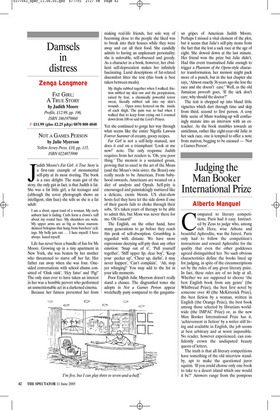Damsels in distress
Zenga Longmore
FAT GIRL: A TRUE STORY by Judith Moore Profile, £12.99, pp. 196, ISBN 1861979860 ✆ £11.99 (plus £2.25 p&p) 0870 800 4848 NOT A GAMES PERSON by Julie Myerson Yellow Jersey Press, £10, pp. 115, ISBN 0224073990 Judith Moore’s Fat Girl: A True Story is a first-rate example of monumental self-pity at its most riveting. The book is a rare delight. The main gist of the story, the only gist in fact, is that Judith is fat. She was a fat little girl, a fat teenager and (although the cover photograph shows an intelligent, slim face) she tells us she is a fat adult:
I am a short, squat toad of a woman. My curly auburn hair is fading. Curls form a clown’s ruff about my round face. My shoulders are wide. My upper arms are as big as those maroonskinned bolognas that hang from butchers’ ceilings. My belly juts out ... I hate myself. I have always hated myself.
Life has never been a bundle of fun for Ms Moore. Growing up in a tiny apartment in New York, she was beaten by her mother who threatened to starve off her fat. Her father ran away when she was four. Onesided conversations with school chums consisted of ‘Oink oink’, ‘Hey fatso’ and ‘Pig!’ The only man ever to have taken an interest in her was a horrible pervert who performed an unmentionable act in a darkened cinema.
Because her fatness prevented her from making real-life friends, her sole way of becoming close to the people she liked was to break into their houses while they were away and eat all their food. She candidly admits to having an unpleasant personality; she is unlovable, self-obsessed and greedy. As a character in a book, however, her ebullient self-deprecation makes her infinitely fascinating. Lurid descriptions of fat-related discomfort litter the text (this book is best taken between meals).
My thighs rubbed together when I walked; friction rubbed my skin raw and the perspiration, raised by fear, a chemically powerful terror sweat, literally rubbed salt into my skin’s wounds ... Open sores festered on the inside of each thigh. The pain was so bad when I walked that to keep from crying out I counted down from 100 or said the Lord’s Prayer.
Yet she continued to gorge her way through what seems like the entire Nigella Lawson Forever Summer of creamy, gooey recipes.
Fat Girl is not a self-help manual, nor does it end on a triumphant ‘Look at me now!’ note. The only response Judith requires from her readers is, ‘Oh, you poor thing.’ The memoir is a sustained groan, proving that to excel in the art of the Moan (and the Moan’s twin sister, the Boast) one really needs to be American. From babyhood onwards, Americans are weaned on a diet of analysts and Oprah. Self-pity is encouraged and painstakingly nurtured like a delicate, exotic bloom. US chat-show hosts feel they have let the side down if one of their guests fails to choke through their sobs, ‘It’s taken years of therapy to be able to admit this, but Mom was never there for me. Oh Gaaard!’ The English, on the other hand, have many generations to go before they reach this peak of self-absorption. Grumbling is regarded with distaste. We have more expressions decrying self-pity than any other emotion: ‘Snap out of it’, ‘Pull yourself together’, ‘Stiff upper lip, dear boy’, ‘Keep your pecker up’, ‘Cheer up, darlin’, it may never happen’, ‘Can’t complain’, ‘Ah, stop yer whinging!’ You may add to the list in your idle moments.
Poor English Julie Myerson doesn’t really stand a chance. The disgruntled tones she adopts in Not a Games Person appear wretchedly puny compared to the gargantu an gripes of American Judith Moore. Perhaps I missed a vital element of the plot, but it seems that Julie’s self-pity stems from the fact that she lost a sack race at the age of eight. She slowed down at the last minute. Her friend won the prize but Julie didn’t. Had this event traumatised Julie enough to trigger a Phantom of the Opera-style character transformation, her memoir might pack more of a punch, but in the last chapter she says, ‘Almost exactly 36 years ago she lost the race and she doesn’t care.’ Well, as the old Jamaican proverb goes, ‘If the sick don’t care, why should the doctor?’ The text is chopped up into bland little vignettes which dart through time and skip from third, second to first person. A cosy little scene of Mum washing-up will confusingly mutate into an interview with an exteacher. As the book stumbles towards an anticlimax, rather like eight-year-old Julie in her sack race, one is tempted to offer a note from matron, begging to be excused — ‘Not a Games Person’.


















































 Previous page
Previous page